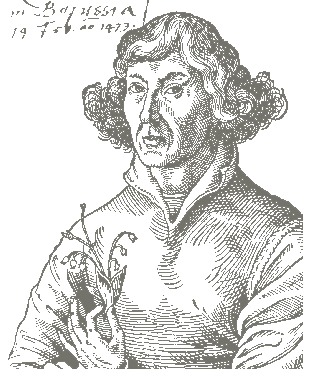
The Autograph De revolutionibus preserved in the Jagiellonian Library is a result of work of the great scholar, intermediate between a rough copy and a fair copy. It had remained in Copernicus' hands until his death (24 May 1543). His papers and books passed to his closest friend, Tiedemann Giese (1480-1550), a bishop in Chelmno at that time. He bequeathed his library to Warmia Chapter. However, the autograph went to the collection of George Joachim Rheticus (1514-1574), astronomer, Copernicus' pupil. Rheticus was occupied with publishing the work of his master, but the basis for printing was not the autograph but its copy. It was also Rheticus who played the main role in spreading the thought and work of Copernicus. The autograph together with its new owner stayed for some time in Leipzig and in Cracow (about 1554 to 1574). Then it went to Kosice (Kaschau). There, after Rheticus' death, the new owner became his pupil and colleague, Valentine Otho (about 1545 - about 1603), who took it with him to Heidelberg. After Otho's death the autograph was bought by a professor from Heidelberg, Jakub Christmann (1554-1613). From professor's widow the manuscript was purchased on 17 January 1614 by the famous scholar and teacher from Moravia, Jan Amos Komensky (1592-1670). May be the autograph together with Komensky came again to Poland.
It is not known what happened to it next. On 5 October 1667 the holdings of Otto von Nostitz (1608-1664) library, located in Jawor Slaski at that time were registered; the Copernicus' autograph is entered in this inventory. Otto left his signature on the flyleaf. The Nostitz library was then moved to Prague. The autograph had stayed in the afore-said library until the end of the Second World War being used by the scholars for the research studies and publications.
In 1945 the collection of Nostitz library in Prague was nationalized by the government of the contemporary Republic of Czechoslovakia and so the Copernicus' manuscript became part of the collection of the National Museum Library in Prague.
On 7 July 1956 the government of Czechoslovakia passed the priceless historical monument, on exchange, to the Polish nation and on 25 September 1956 it was given to Jagiellonian University in Cracow. Finally, the autograph was taken care of by the university in which Nicholas Copernicus was educated and from which he received scientific foundation for his memorable work.
 De revolutionibus home page
De revolutionibus home page